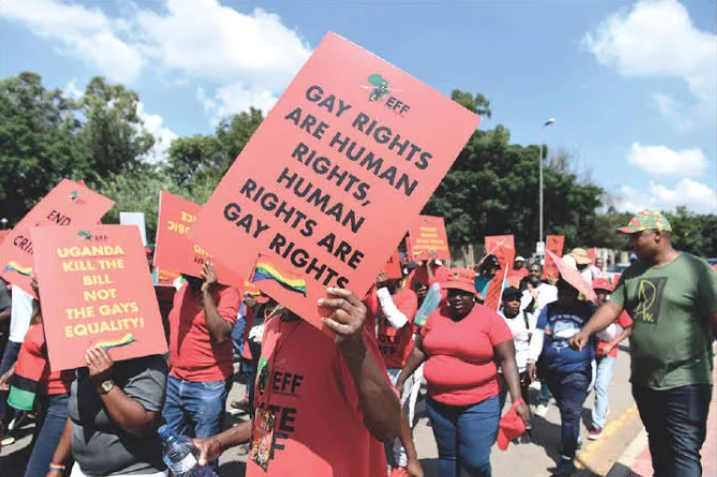By: ALINDA BAGENDA GRACE
MBARARA: Gender and sexual minorities, including lesbian, gay, bisexual, transgender and queer people (LGBTQ+) have a higher relative risk of acquiring HIV than the general population yet face significant barriers to accessing prevention, care, and treatment services due to stigma and criminalization, sources have revealed.
This discrepancy has only worsened in Uganda since lawmakers enacted the Anti-Homosexuality Act in May 2023.
Annita Matsika, a senior health journalist based in Mbarara, notes that in Greater Western Uganda, a region with over 20 million people, there are only two drop-in health clinics known to offer LGBTQ+ people safe and inclusive treatment.
Some providers may not be knowledgeable about LGBTQ+ health issues or may hold biases that can impact the quality of care, according to Matsika.
This lack of understanding can make individuals hesitant to seek medical assistance, Matsika says, adding that awareness and education are essential.
“Healthcare providers need to undergo refresher trainings by the Ministry of Health and non-government organizations to increase their competency and understanding of LGBTQ+ health issues to create safe spaces where individuals feel comfortable discussing their health concerns,” she says.
Several health organizations in Uganda are now ramping up efforts to attend to LGBTQ+ people’s health needs by providing resources, capacity building and networking to help individuals find affirming healthcare providers.
Justus Ampire, the executive director of St. Augustine Community Health Centre in Mbarara City, notes that since the passing of the Anti-Homosexuality Act, LGBTQ+ people are increasingly being harassed and their rights violated by denying them treatment and medication, especially in government facilities.
“We [at St. Augustine] are inclusive, and everyone has a right to receive medical care regardless of their sexual orientation, [but still] our work has been compromised. Patients no longer come like before the Act, or if they are coming, we may not easily identify them because of fear of their safety,” he says.
Ampire is worried LGBTQ+ people are silently suffering and dying of the same diseases for which straight and cisgender people receive free treatment.
“We are in a dilemma because it was under the watch of the Ministry of Health that the law was passed. To compromise health services is a violation of the [universal] right to access health care in Uganda. Providing health services in Uganda [to LGBTQ+ people] is now a risk.
“You are not sure whether this person seeking a service is genuinely gay or is a straight person trying to disguise as gay in order to either get you arrested or put you in a trap for your operating license to be revoked or actually to be prosecuted in courts of law because the enforcement officers are looking to show their bosses that they are working,” he says.
Ampire adds that health workers at St. Augustine have put extra measures in place to protect themselves from being criminalized for doing their work because they are operating in a high-risk environment.
Center management has trained health workers to serve and love everyone regardless of their sexual orientation and implemented community outreaches to serve everyone in their localities.
“The biggest challenge so far since the passing of the AHA is that people are shunning service provision and resorting to bad practices that endanger their lives even more than the law, practices like using liquid soaps and cooking oils instead of lubricants for sex,” he says, adding that lubricants could be available in some pharmacies but extremely expensive.
”Previously, government has been having lubricants at referral hospital levels and giving to accredited private health facilities to distribute for free which stopped and now people are fearing to go to government facilities because it could be a trap noting that there is a challenge of the interpretation of the law for example distributing lubricants is taken to be as promotion of homosexuality yet its a service,” he says.
Ampire says the Ministry of Health should re-activate key population departments, reassure health workers of their safety, and ensure that everyone gets services regardless of their sexuality. With challenges to the Anti-Homosexuality Act now before Uganda’s Constitutional Court, he hopes it will be overturned.
Eric (not his real name) is a Trans man and community coordinator for the International Community of Women living with HIV/AIDS (ICWEA), the only international network run for and by HIV-positive women in Uganda. Eric says life in Uganda as a trans person is a living Hell. He says that living with HIV and being a trans man is like adding salt to a bad wound.
As an activist, he says he is overwhelmed by the number of gay and trans people who come to him for medical assistance. It is very insecure for LGBTQI+ people to openly and freely discuss with health workers about their health issues due to fear of criminalization, discrimination and persecution, he said. Ever since the [Anti-Homosexuality Act] was passed, some facilities, especially the government ones, have stopped offering services to LGBTQ+ people, and this limits access to quality health care services for them.”
He notes that before the Act, LGBTQ+ people could more easily reach out to health providers for services, but now he does not trust most providers.
“I have disguised myself in order to get any kind of help. It is hard to disclose my sexuality anymore,” he said.
Eric says he has tried to reach out to as many LGBTQ+ people about ICWEAs services as he can but that too little is being done to help them.
“I reach so many communities and come across cases that are not in my job description, but as a single person, what can I do to help all these people? Even if I refer them to trusted clinics, many of them do not reach out due to fear. Who is going to help us?” he asks.



